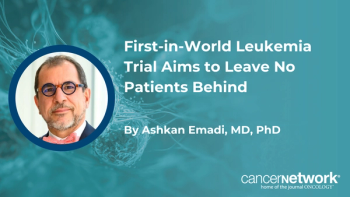
Lenalidomide Consolidation Benefits CLL Patients Post Chemoimmunotherapy
Chemoimmunotherapy followed by lenalidomide consolidation is tolerated and extends PFS and OS in CLL patients.
A short course of lenalidomide consolidation after receiving chemoimmunotherapy extended survival in patients with non-del(11q) chronic lymphocytic leukemia (CLL), according to
“This large randomized phase II study has identified two treatment strategies that could be pursued in future phase III trials for previously untreated non-del(11q) CLL patients requiring therapy, including chemoimmunotherapy with either FR+L or FCR,” wrote study authors led by John C. Byrd, MD, at The Ohio State University.
The authors noted that both treatment strategies exceeded the 2-year progression-free survival (PFS) rate observed with fludarabine plus cyclophosphamide (FC) in earlier studies. The results and analysis of the study were
Byrd and colleagues conducted the phase II study in an attempt to define the role of lenalidomide in patients with non-del(11q) disease. The researchers randomly assigned 342 treatment-naive patients to FR (n = 123), FR+L (n = 109), or FCR (n = 110) and compared survival rates with historical controls treated with FC.
The 2-year PFS rate for patients assigned to FR was 64%. In comparison, the 2-year PFS rate was 72% for FR+L and 74% for FCR. Both FR+L and FCR had rates significantly greater than those seen in the historical controls (60%).
The median PFS of 43 months for patients assigned FR was significantly shorter than that for patients assigned FR+L (61 months; P = .04) and those assigned FCR (97 months; P < .001).
With a median follow-up of 73 months, the median overall survival (OS) was only reached in patients assigned FCR (101 months). Treatment with FR+L resulted in a risk for death that decreased over time and was lower than treatment with FR at later time points (P = .01). However, the risk for death with FR+L was not significantly different from FCR (P = .21).
“The mechanism accounting for clinical benefit of lenalidomide consolidation therapy in our study is unknown,” the researchers wrote. “However, the findings are consistent with positive data from lenalidomide maintenance trials in CLL and lymphoma, despite lack of deepening response.”
The majority of patients received all 6 cycles of induction therapy regardless of treatment arm. Failure to complete therapy was most commonly caused by failure to recover blood counts, toxicity of therapy, or disease progression. Six deaths occurred, three with FR and three with FCR.
In general, “adverse events were manageable and typical of those reported with these different chemoimmunotherapy regimens or monotherapy with lenalidomide,” according to the researchers.
“The relevance of this study’s findings in the context of a rapidly moving field of CLL therapeutics must be considered and outside of the lenalidomide consolidation arm are of little impact,” the researchers concluded.
Newsletter
Stay up to date on recent advances in the multidisciplinary approach to cancer.














































